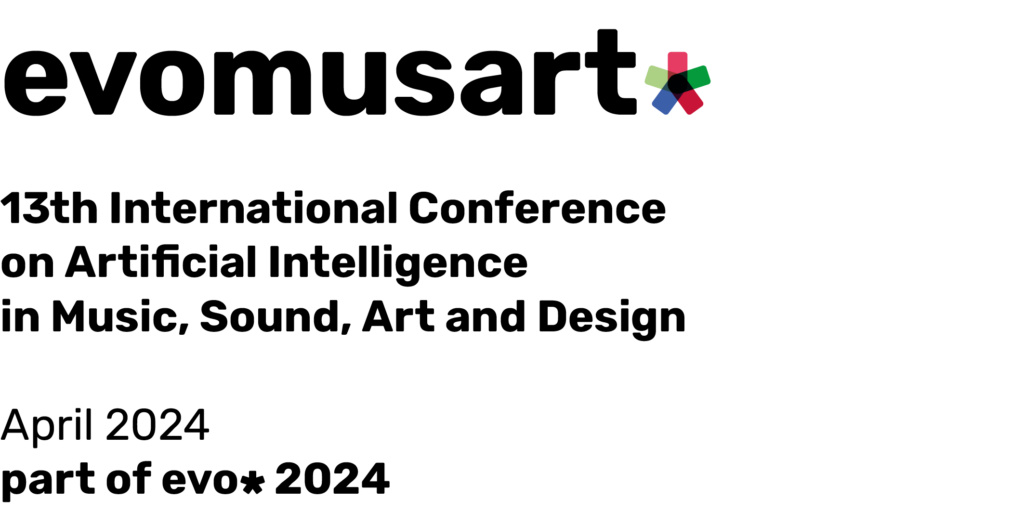
The 13th International Conference on Artificial Intelligence in Music, Sound, Art and Design (EvoMUSART) 2024 is a multidisciplinary conference that brings together researchers who are working on the application of Artificial Intelligence techniques in creative and artistic fields.
There is a growing interest in the application of Artificial Neural Networks, Evolutionary Computation, Swarm Intelligence, Cellular Automata, Alife, and other Artificial Intelligence techniques in fields such as: visual art and music generation, analysis, and interpretation; sound synthesis; architecture; video; poetry; design; and other creative tasks. Therefore, the use of Artificial Intelligence in such creative domains became a significant and exciting area of research. EvoMUSART provides the opportunity to present, discuss and promote innovative contributions and ongoing work in the area.
Following the success of previous events and the importance of the field of Artificial Intelligence applied to music, sound, art and design, EvoMUSART has been an evo* conference with independent proceedings since 2012. The EvoMUSART proceedings have been published in Springer Lecture Notes in Computer Science (LNCS).
Download the CFP in PDF here.
NEW: The proceedings of EvoMUSART 2024 is available on this link.
Conference Chairs
- Colin Johnson
University of Nottingham, United Kingdom
Colin.Johnson(at)nottingham.ac.uk - Sérgio Rebelo
University of Coimbra, Portugal
srebelo(at)dei.uc.pt
Publication Chair
- Iria Santos
Universidade da Coruña, Spain
iria.santos(at)udc.es
Areas of Interest and Contributions
Submissions should concern the use of Artificial Intelligence techniques (e.g. Evolutionary Computation, Artificial Neural Networks, Artificial Life, Machine Learning, Deep Learning, Swarm Intelligence) in the generation, analysis and interpretation of art, music, design, architecture and other creative and artistic fields. Topics of interest include, but are not limited to:
Generation
- Systems that create drawings, images, animations, sculptures, poetry, text, designs, webpages, buildings, etc.;
- Systems that create musical pieces, sounds, instruments, voices, sound effects, sound analysis, etc.;
- Systems that create artefacts such as game content, architecture, furniture, based on aesthetic and functional criteria;
- Robotic-based Evolutionary Art and Music;
- Other related artificial intelligence or generative techniques in the fields of Computer Music, Computer Art, etc.
Automation
- Techniques for automatic fitness assignment;
- Systems in which an analysis or interpretation of the artworks is used in conjunction with artificial intelligence techniques to produce novel objects;
- Systems that resort to artificial intelligence approaches to perform the analysis of image, music, sound, sculpture, or some other types of artistic object or resource.
Computer Aided Creativity and Computational Creativity
- Systems in which artificial intelligence is used to promote the creativity of a human user;
- New ways of integrating the user in the evolutionary cycle;
- Analysis and evaluation of: the artistic potential of biologically inspired art and music; the artistic processes inherent to these approaches; the resulting artefacts;
- Collaborative distributed artificial art environments;
- Contextualisation of creative AI in cultural, economic, social, political or ecological discourse.
Theory
- Computational Aesthetics, Experimental Aesthetics; Emotional Response, Surprise, Novelty;
- Representation techniques;
- Surveys of the current state-of-the-art in the area; identification of weaknesses and strengths; comparative analysis and classification;
- Validation methodologies;
- Studies on the applicability of these techniques to related areas;
- New models designed to promote the creative potential of biologically inspired computation.
Submission Details
Submission closed.
The acceptance rate at EvoMUSART 2023 was 36% for papers accepted for long talks and 13% for short talks.
Programme Committee
Sebastian von Mammen, Julius-Maximilians-University WürzburgBrian Ross, Brock University
Jean-Pierre Briot, LIP6, Sorbonne University — CNRS
Max Peeperkorn, University of Kent
Antonios Liapis, University of Malta
Marcelo Caetano, CNRS-PRISM
Christopher J. Tralie, Ursinus College
Fabian Ostermann, TU Dortmund
Luis Teixeira, University of Porto
Georgios Diapoulis, Chalmers University of Technology
Camilo Cruz Gambardella, Monash University
Igor Vatolkin, RWTH Aachen University
Álvaro Torrente Patiño, University of A Coruña
Günter Rudolph, TU Dortmund
Pedro Martins, University of Coimbra
Amilcar Cardoso, University of Coimbra
Louis Philippe Lopes, Lusófona University
João Correia, University of Coimbra
Tiago Martins, University of Coimbra
Jéssica Parente, University of Coimbra
Rolando Miragaia, Polytechnic Institute of Leiria
Nereida Rodríguez, University of A Coruña
Daniel Jones, Sonos, Inc.
Paulo Urbano, University of Lisbon
María Navarro, University of Salamanca
Stephen Todd, Goldsmiths, University of London
Alain Lioret, Paris 8 University Vincennes-Saint-Denis
John P. Lewis, Victoria University of Wellington
João Macedo, University of Coimbra
Vic Ciesielski, RMIT University
João Miguel Cunha, University of Coimbra
Penousal Machado, University of Coimbra
Daniel Bisig, Zurich University of the Arts
Carlos León, Complutense University of Madrid
Edward Easton, Aston University
Catarina Maçãs, University of Coimbra
Daniel Silva, University of Porto
Oliver Bown, University of New South Wales
Gilberto Bernardes, University of Porto
Olga Vechtomova, University of Waterloo
Somnuk Phon-Amnuaisuk, Universiti Teknologi Brunei
Björn Gambäck, Norwegian University of Science and Technology
Matthew Lewis, Ohio State University
Miguel Angel Casal Santiago, PhotoILike
Maximos Kaliakatsos-Papakostas, Hellenic Mediterranean University
Teresa Llano Rodriguez, Monash University
Carlos Grilo, Polytechnic Institute of Leiria
Hans Dehlinger, University of Kassel
Michael O’Neill, University College Dublin
Róisín Loughran, Dundalk Institute of Technology
Varvara Guljajeva, Hong Kong University of Science and Technology (Guangzhou)
Pablo Gervás, Complutense University of Madrid
Jon McCormack, Monash University
Jose Fornari, UNICAMP
Anna Jordanous, University of Kent
Jonathan E. Rowe, University of Birmingham
Andrew Horner, The Hong Kong University of Science and Technology
Juan Romero, University of A Coruña
Marco Scirea, University of Southern Denmark